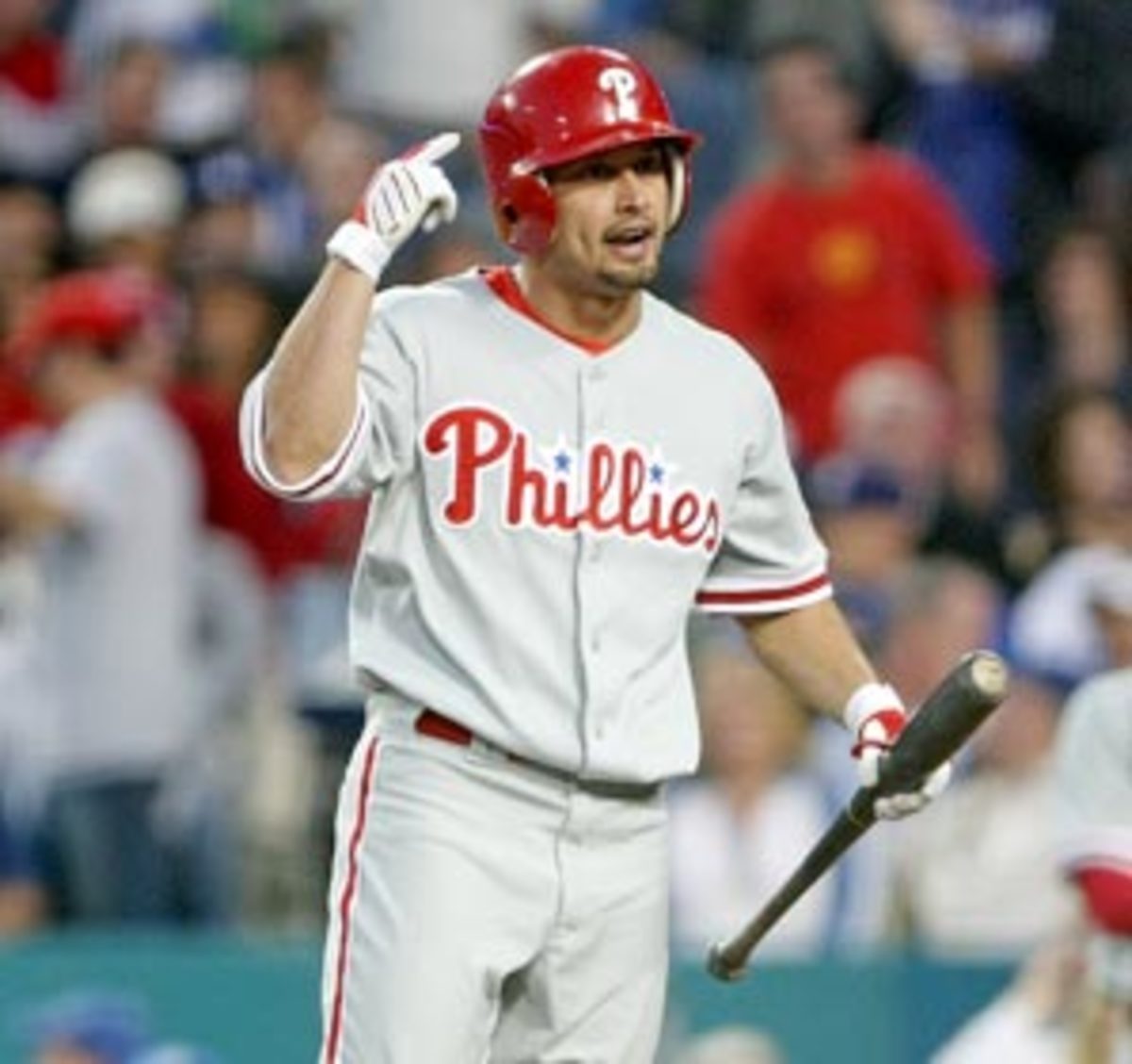Victorino lets his bat do the talking
LOS ANGELES -- During the National League Championship Series, after he had played a starring role in yet another big postseason game, Shane Victorino stood in front of his cramped locker at Dodger Stadium while a group of reporters huddled around him. Fellow Phillies outfielder Jayson Werth looked over at Victorino and smiled. "He talks a lot," said Werth. "He always has a lot to say." It was a sentiment echoed by every one of his teammates as they walked past their opinionated sparkplug. "He talks too much," said Ryan Howard. "He never stops."
It made perfect sense, then, that when Fox wanted to have a player wear a microphone during Game 5 of the NLCS, Victorino was the choice. And even though he made headlines for screaming and signaling to Dodgers pitcher Hiroki Kuroda right before a bench-clearing incident during Game 3, for the most part Victorino has let his play on the field do the talking for him this October. In fact, his performance on the field and his personality off it have cemented him as one of the most beloved Phillies ever, right alongside fellow pesky sparkplug and centerfielder Lenny Dykstra, who helped lead the Phillies to their last World Series in 1993.
While Victorino is a native of Wailuku, Hawaii, his game is more South Street than South Shore. He is a 5-foot-9, 180-pound ball of energy every time he takes the field, running his mouth, making big plays and getting his jersey dirty along the way. It's hard not to think of a memorable moment during the Phillies' best postseason run in 15 years and not think of the switch-hitting "Flyin' Hawaiian."
He hit the Phillies' first postseason grand slam in Game 2 of the NLDS against C.C. Sabathia, becoming the first player in postseason history to have a homer, a double and two steals in a single game.
He drove in four runs in Game 2 of the NLCS and robbed Casey Blake of a potential game-tying three-run home run with a leaping catch at the centerfield fence. (It was a joyous moment that was short lived after he was informed afterwards that his grandmother, Irene Victorino, had died earlier in the day in Hawaii.)
In Game 4, as Dodger fans prepared to celebrate another home win and a 2-2 series tie in the NLCS, Victorino hit a game-tying two-run homer off Corey Wade that blunted the Dodgers' momentum and turned the serious decisively back in the Phillies' favor.
Finally, in the clinching Game 5, Victorino had a hit and two walks, and showed remarkable range in making a pair of impressive catches in the late innings that kept the Dodgers from climbing back in the game, and perhaps, the series.
"My dad always told me as a kid, and my parents always told me, always hustle," said Victorino, who has a franchise record 11 postseason RBI. "Being called a high-energy guy, I think that has a lot to do with just going out there and playing the game, basically 100 miles an hour, try to play the game hard. I like having fun. And I think that a lot of people know it. Everybody is always saying, 'Why are you always smiling?' I'm having fun. To have the opportunity to come out here every day, it's a lifelong dream and lifelong goal."
The irony is that Victorino's dream was to be wearing Dodger blue and his goal was to be playing centerfield at Dodger Stadium. Victorino was drafted by the Dodgers out of high school in the sixth round of the 1999 draft and was twice given up for grabs in the Rule V draft for $50,000. In 2002, the Padres chose him but eventually sent him back to the Dodgers, who couldn't give him away until the Phillies finally took a flier on him in late 2004.
Victorino, 27, rewarded the Phillies for the opportunity, earning the International League's MVP after batting .310 with career highs in hits (153), home runs (18) and RBI (70) at Triple-A Scranton.
Manuel kept close tabs on Victorino while he was away, often getting messages from Scranton manager Gene Lamont, who called Victorino the best center fielder he had seen since Andy Van Slyke. "Gene Lamont would send in reports on him and I would get them on my voice mail," said Manuel. "How good he was playing and how good a player he was, how good a center fielder he was, and when he came up that year at the end of the season, I was very anxious to put him out there and let him play."
What Manuel quickly discovered was that he couldn't take Victorino out of the lineup and had to find way to get him on the field. The scrappy switch hitter that would often lose focus during spring training was leading the Phillies in sacrifices (8) and outfield assists (11) and did not commit an error all season in 2005. His performance allowed the Phillies to trade Bobby Abreu in 2006and last winter eased the loss of Aaron Rowland as a free agent.
"He's very, very, very full of energy," said Howard, who has struggled this postseason while watching Victorino lead the team in hits (9), total bases (20), steals (3) and RBI (11). "He's our little sparkplug. He's wirey, he's firey and he'll always go out there and make a big play. He will hit a triple or a double or do whatever it takes for us to win and he's not afraid to show his emotions out there."






